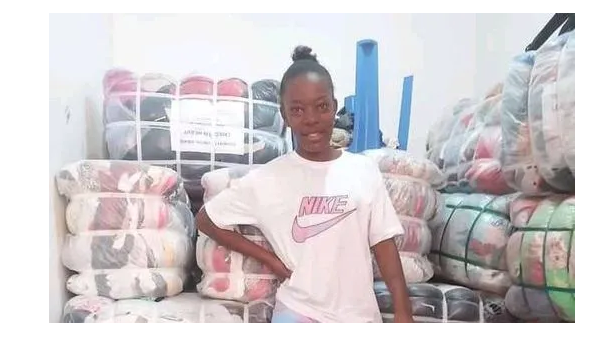In the bustling streets of Nairobi, where each day presents new challenges, the remarkable odyssey of Stacey Auma emerges as a testament to unwavering determination, persistence, and relentless hard work.
Stacey’s narrative serves as an inspirational beacon for anyone who dares to dream big and endeavors to attain their aspirations, regardless of formidable obstacles.
Stacey’s initial foray into entrepreneurship involved peddling secondhand clothing on Nairobi’s bustling streets. This venture was fraught with risks, as county government officials frequently targeted her and her fellow traders, leading to constant threats of arrest.
However, Stacey remained undaunted by these adversities. She continued to explore opportunities to make ends meet, even going to the extent of distributing her resume in various locations in pursuit of alternative employment. Regrettably, her tireless efforts did not yield the positive outcome she had hoped for.
After enduring the heartbreak of failing to secure stable employment, Stacey was confronted with the daunting task of finding new avenues for survival. Initially, she turned to washing clothes for residents in Nairobi’s Greenspan area, but severe back pain forced her to discontinue this physically demanding work.
During her quest for financial stability, Stacey’s mother offered a suggestion that would alter the course of her life. Her mother encouraged her to start a food vending business, a venture she embarked upon. Nonetheless, after incurring losses for four months, Stacey decided to pivot once more.
Stacey’s indomitable spirit led her to explore Gikomba Market, a bustling hub of commerce in Nairobi. Armed with just Sh. 1,000, she made a bold move by purchasing 30 sweater tops for Sh. 30 each, which she later resold for Sh. 100 each, yielding a tidy profit of Sh. 70 per piece. Despite facing arrest on her very first day as a jumper vendor, Stacey was undeterred. She persisted, and the following day, she managed to sell all her jumpers.
“I was arrested at 6 pm and released at 9 pm. I had to call my mother to send me bus fare because I had not sold anything. The following day I was there again, and this time, I sold all the jumpers. This boosted my morale so much,” she reminisced.
Stacey’s remarkable success in selling jumpers served as a beacon of hope. It inspired her to collaborate with other women, pooling their resources to order a container of bales. Upon receiving the bales, they divided the merchandise among themselves and embarked on a collective journey of selling secondhand clothes.
Stacey’s entrepreneurial spirit didn’t end there. She went on to establish her own shop in Gikomba, where she offers a wide range of products, including secondhand clothes, handbags, shoes, and household items. Leveraging the power of social media, she adeptly markets her products, attracting a broader customer base.
Despite the challenges inherent in running a business, such as procuring bales containing subpar clothes that result in losses, Stacey remains resolute. In such instances, she bears the loss alongside her customers. Moreover, she contends with the demanding task of managing dissatisfied customers who are unhappy with her products.
She attributes her success to her mother’s unwavering support and the collective effort of the women who contributed funds that enabled them to order a container of bales.
In addition to her thriving business, Stacey dons another hat as a football coach. She shares her passion for the sport by training the Black Warrior soccer team based in Ruiru, Nairobi. Her journey in football began during her time as a student at the Kibera Girls Soccer Academy, where she honed her skills for four years before transitioning into coaching.



